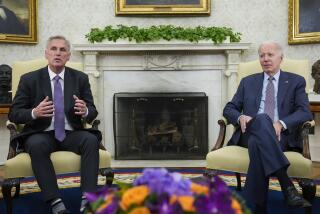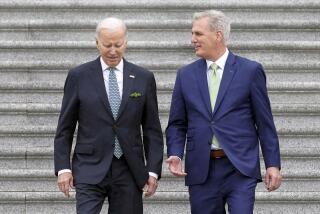Congress Eyes Tobacco Pact Warily
- Share via
WASHINGTON — By nearly all estimates, Congress will take its sweet time to enact or modify the huge, complicated agreement intended to settle a spate of liability lawsuits against the tobacco industry.
Although lawmakers typically act sooner rather than later when they can discern the contours of public opinion on high-profile issues, the risks of rushing to stake out firm positions on tobacco appear to outweigh the benefits.
“The nature of the settlement is beyond most Americans’ ability to comprehend,” said Robert J. Blendon, a professor of health policy at Harvard University. “The average John Q. Public is waiting for credible groups, like the American Heart Assn. or the American Lung Assn., to tell him whether it’s a good deal or a bad deal.”
So are lawmakers.
“The tendency of Congress would be to water this [settlement] down, but they don’t dare do that out of fear it might trigger a huge public backlash,” Blendon said. “The key issue right now is whether the health establishment takes a position and tells the public this is a good deal.”
As lawmakers wait for public opinion to congeal, action on Capitol Hill concerning the tobacco pact is out of order for the foreseeable future.
“This issue is something of a tar baby because they haven’t yet heard whether there is going to be blame or credit with the settlement,” said John Coffee, a professor at Columbia University Law School. “They don’t want to say broadly that [the proposed settlement] is good enough and have something in the fine print blow up to the point where the public says this is not good enough.”
Usually, congressional committee chairpersons are quick to call dibs on big legislative issues, scrambling to be the first to conduct hearings and bask in the resulting publicity.
But in the week immediately after the announcement of a $368.5-billion settlement that could restructure the tobacco industry and change the way Americans relate to smoking, only the Senate Judiciary Committee, chaired by tobacco foe Sen. Orrin G. Hatch (R-Utah), scheduled a hearing.
Several committees, in both the Senate and House, will have jurisdiction over the sweeping legislation that would establish a new national tobacco policy. But so far, no one besides Hatch has stepped forward.
“I’m thinking that maybe people are a little gun-shy on this one,” said Jim Manley, a spokesman for Sen. Edward M. Kennedy (D-Mass.).
As if to underscore that assessment, House Speaker Newt Gingrich (R-Ga.) told reporters he is urging his colleagues to hold off on forming their opinions.
“I suggest that every member of the House and Senate wait until the president has made a decision,” Gingrich said. “Then we’ll have very thorough, careful hearings, with plenty of time for everybody to testify, before any member makes any decision about that complex agreement.”
Under the proposed settlement, tobacco firms would avoid 40 lawsuits filed against them by states, as well as additional suits filed on behalf of class-action claimants, seeking reimbursement of health-related expenses. In exchange, the industry agreed to pay $368.5 billion to reimburse states for smoking-related costs, to fund anti-smoking advertising campaigns and smoking-cessation programs and to accept major restrictions on its advertising and marketing programs.
*
One reason lawmakers are reluctant to rush into debate over the settlement is that they played no role in drafting any of the provisions. Although the agreement was struck among 40 state attorneys general, tobacco industry officials and private anti-tobacco lawyers, it requires congressional action and a presidential signature to implement the changes in a host of federal laws that affect the industry.
“It’s a nonagreement agreement,” said one Senate staffer. “That was a deal that the House and the Senate were not a party to. Congress will do something on its own, and we could be looking at a very long process before we do anything.”
Blendon said many members of Congress have long-standing ties to the tobacco industry, which for decades has been one of Washington’s most generous campaign donors. That, he said, makes lawmakers wary of appearing to be eager to protect campaign contributors, who are increasingly unpopular with voters.
“I can’t imagine Congress being more restrictive than the settlement proposes,” Blendon said. “There are too many friends of the [tobacco] industry in the leadership of Congress.”
So, Blendon and other observers say, Congress is awaiting guidance from the White House and representatives of health advocacy organizations. Influential with broad groups of Americans, organizations such as the American Cancer Society and the American Lung Assn. have a network of loyal supporters. While these groups have unsuccessfully lobbied Congress for decades to restrict tobacco products, individual lawmakers are now seeking their advice as cover for their future positions and votes on the settlement.
For the moment, public health advocates are working at their own pace to draft a response to the proposed agreement. Last week, the Advisory Committee on Tobacco Policy and Public Health, an ad hoc group formed by former Surgeon General C. Everett Koop and former Food and Drug Administration Chief David A. Kessler, issued a preliminary report calling the deal “inadequate.”
But the group stopped short of rejecting the proposal. Koop, for instance, said some provisions included in the deal could “be fixed” and win his support. That, however, would require pressure from Congress or the White House, he said.
President Clinton, for his part, has remained circumspect. After the tobacco deal was announced, White House officials said Health and Human Services Secretary Donna Shalala would lead a monthlong administration review of the proposal before the president would offer his opinion.
Coffee said the administration was fully briefed by negotiators as the settlement was being crafted, and that it is more concerned about discerning public opinion than clarifying details of the accord.
“They don’t need 30 days to determine what the president thinks,” Coffee said. “But 30 days is what you need to get credible data from public opinion polls. They’re playing their own waiting game too.”
One poll, taken immediately after the deal was announced, found that Americans tend to favor the proposal but are doubtful that it would achieve the goal of curtailing underage smoking.
The USA Today/CNN/Gallup poll of more than 1,000 adults discovered that 40% of respondents supported the settlement’s provisions. But 45% didn’t think it would stop young people from smoking.
*
The poll, which has a margin of error of 3 percentage points, also found that 35% said they believe the deal is not tough enough on the tobacco industry, 21% think it’s tough enough, and 20% say it’s too tough on cigarette companies.
Blendon, however, is wary of the early surveys. “I wouldn’t trust any poll one whit that shows up in a week,” he said. “My guess is that once the supporters and opponents get done with their sales pitches, the opinions will move from where they were right after the settlement was announced.”
But the polls are a leading indicator that lobbying--for and against--the proposed settlement is about to shift into high gear. In the coming weeks, look for television ads, radio talk shows and opinion-page efforts to sway public opinion, Coffee said.
“Congress will respond more to public opinion polls than any policy papers,” he said.
More to Read
Get the L.A. Times Politics newsletter
Deeply reported insights into legislation, politics and policy from Sacramento, Washington and beyond. In your inbox three times per week.
You may occasionally receive promotional content from the Los Angeles Times.










